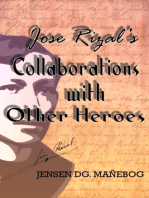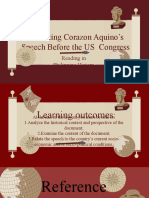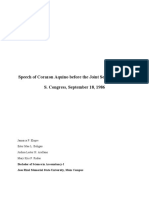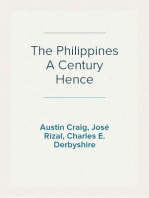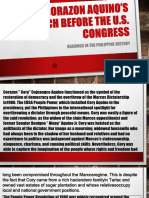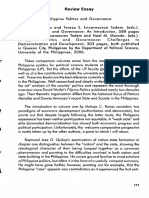100%(3)100% found this document useful (3 votes)
983 viewsRevisiting Corazon Aquino's Speech Before The U
Revisiting Corazon Aquino's Speech Before The U
Uploaded by
Pearl CalisIt is all about Cory Aquino's Speech during the US Congress when she became the president in the Philippines.
Copyright:
© All Rights Reserved
Available Formats
Download as PPTX, PDF, TXT or read online from Scribd
Revisiting Corazon Aquino's Speech Before The U
Revisiting Corazon Aquino's Speech Before The U
Uploaded by
Pearl Calis100%(3)100% found this document useful (3 votes)
983 views24 pagesIt is all about Cory Aquino's Speech during the US Congress when she became the president in the Philippines.
Original Title
Revisiting Corazon Aquino’s Speech Before the U
Copyright
© © All Rights Reserved
Available Formats
PPTX, PDF, TXT or read online from Scribd
Share this document
Did you find this document useful?
Is this content inappropriate?
It is all about Cory Aquino's Speech during the US Congress when she became the president in the Philippines.
Copyright:
© All Rights Reserved
Available Formats
Download as PPTX, PDF, TXT or read online from Scribd
Download as pptx, pdf, or txt
100%(3)100% found this document useful (3 votes)
983 views24 pagesRevisiting Corazon Aquino's Speech Before The U
Revisiting Corazon Aquino's Speech Before The U
Uploaded by
Pearl CalisIt is all about Cory Aquino's Speech during the US Congress when she became the president in the Philippines.
Copyright:
© All Rights Reserved
Available Formats
Download as PPTX, PDF, TXT or read online from Scribd
Download as pptx, pdf, or txt
You are on page 1of 24
Revisiting Corazon
Aquino’s Speech Before
the U.S. Congress
GROUP 5
PAMITTAN, CHARIE MAE
CALIS, PEARL JUFLOR
SUGAO, LAILA
APOSTOL, JHENNY
SUYAO, JOLINA
BANGIBANG, NEIPHEL
MANGAWIT, LACSON
OBSANIA, DRANREB JAY
Corazon “Cory”
Cojuangco Aquino
“The Mother of Revolution”
Functioned as the symbol of
the restoration of
democracy and the
overthrow of the Marcos
Dictatorship in 1896.
The People Power Revolution of
Was a series of1986
popular
demonstrations in the Philippines
that began in 1983 and culminated in
1986. The methods used amounted to
a sustained campaign of civil
resistance against regime violence
and electoral fraud. This case of
nonviolent revolution led to the
departure of President Ferdinand
Marcos and the restoration of the
country’s democracy.
September 18, 1986
was the time when Corazon
Aquino went to United States
and spoke before the joint
session of the U.S.
In her speech she talks about
the three times that they lost
Ninoy including his demise on
August 23, 1983.
The first time was when the
dictatorship detained Ninoy with
other dissenters.
Cory related:
“The government sought to break him indignities and terror.
They locked him up in a tiny, nearly airless cell in a military
camp in the north. They stripped him naked and held a threat
of a sudden midnight execution over his head. Ninoy held up
manfully under all of it. I barely did as well. For forty-three
days, the authorities would not tell me what had happened to
him. This was the first time my children and I felt we had lost
him.”
Cory continued, when Ninoy
survived the first detention, he
was then charged of subversion,
murder, and other crimes. He was
tried by a military court, whose
legitimacy Ninoy adamantly
questioned. To solidify his
protest, Ninoy decided to do a
hunger strike and fasted for 40
days. Cory treated this event as
the second time they lost him.
She said:
“When that didn’t work, they put him on a trial of
subversion, murder and a host of other crimes before a military
commission. Ninoy challenged its authority and went on a fast.
If he survived it, then he felt God intended him for another fate.
We had lost him again. For nothing would hold him back from
his determination to see his fast through to the end. He stopped
only when it dawned on him that the government would keep his
body alive after the fast had destroyed his brain. And so, with
barely any life in his body, he called off the fast on the 40th
day.”
Ninoy’s death was the third and the
last time that Cory and their children
lost Ninoy.
She continued:
“And then we lost him irrevocably and more painfully than
in the past. The news came to us in Boston. It had to be after
the three happiest years of our lives together. But his death was
my country’s resurrection and the courage and faith by
which alone they could be free again. The dictator had called
him a nobody. Yet, two million people threw aside their
passivity and fear and escorted him to his grave.”
Cory attributed the peaceful EDSA
Revolution to the martyrdom of
Ninoy. She stated that the death
of Ninoy sparked the revolution
and the responsibility of “offering
the democratic alternative” had
“fallen on her shoulders.” Cory’s
address introduced us to her
democratic philosophy, which she
claimed she also acquired from
Ninoy.
“I held fast to Ninoy’s conviction that it must be by ways of democracy. I
held out for participation in 1984 election the dictatorship called, even if I
knew it would be rigged. I was warned by the lawyers of the opposition, that
I ran the grave risk of legitimizing of the foregone results of elections that
were clearly going to be fraudulent. But I was not fighting for lawyers but for
the people whose intelligence, I had implicit faith. By the exercise of
democracy even in a dictatorship, they would be prepared for democracy
when it came. And then also, it was the only way I knew by which we could
measure our power even in terms dictated by the dictatorship. The people
vindicated me in an election shamefully marked by government thuggery and
fraud. The opposition swept the elections, garnering a clear majority of the
votes even if they ended up with barely a third of the seats in Parliament.
Now, I knew our power.”
Cory emphasized the importance of
EDSA Revolution in terms of being a
“limited revolution that respected
the life and freedom of every Filipino.
She boasted of the restoration of a
fully constitutional government
whose constitution gave utmost
respect to the Bill of Rights.
She reported to the U.S. Congress:
“Again as we restore democracy by the ways of democracy,
so are we completing the constitutional structures of our new
democracy under a constitution that already gives full respect
to the Bill of Rights. A jealously independent constitutional
commission is completing its draft which will be submitted later
this year to a popular referendum. When it is approved, there
will be elections for both national and local positions. So,
within about a year from a peaceful but national upheaval that
overturned a dictatorship, we shall have returned to full
constitutional government.”
Cory then proceeded on her peace
agenda with the existing communist
insurgency, aggravated by the dictatorial
and authoritarian measure of Ferdinand
Marcos.
She asserted:
“My predecessor set aside democracy to save it from a
communist insurgency that numbered less than five hundred.
Unhampered by respect for human rights he went at it with
hammer and tongs. By the time he fled, that insurgency had
grown to more than sixteen thousand. I think there is a lesson here
to be learned about trying to stifle a thing with a means by which
it grows.”
The Philippine Foreign Debt
In the 1970’s Marcos took out huge amounts
of foreign currency loans that by the 1980’s
his regime could not repay. He tried to hide
the dire financial situation by overstating
the figures for foreign reserves. By then the
economy was in free fall: GDP growth
dropped 5.3 percent, prices of primary
export commodities fell by 50 percent,
workers’ wages were reduced, and
unemployment hit of the labor force. The
crisis worsened with the assassination of
Ninoy Aquino in August 1983.
She
“ lamented:
Finally may I turn to that other slavery, our
twenty- six billion dollar foreign debt. I have said
that we shall honor it. Yet, the means by which we
shall be able to do so are kept from us. Many of the
conditions imposed on the previous government
that stole this debt, continue to be imposed on us
who never benefited from it.”
She stated:
“Wherever I went in the campaign, slum area or
impoverished village. They came to me with one cry,
democracy. Not food although they surely wanted it but
democracy. Not money, for they gave what little they had to
my campaign. They didn’t expect me to work a miracle that
would instantly put food into their mouths, clothes on their
back, education in their children and give them work that
will put dignity in their lives. But I feel the pressing
obligation to respond quickly as the leader of the people so
deserving of all these things.”
Cory further lamented that
these problems worsened by the
crippling debt because half of
the country’s export earnings
amounting to $2 billion would
“go to pay just the interest on a
debt whose benefit the Filipino
people never received.”
In her speech Cory even asked a
rather compelling question to the
U.S. Congress:
“Has there been a greater test of national
commitment to the ideals you hold dear than that my
people have gone through? You have spent many lives
and much treasure to bring freedom to many lands that
were reluctant to receive it. And here, you have
people who want it by themselves and need only the
help to preserve it.”
She ended her speech by
thanking America for serving as
home to her family for what he
referred to as the “three
happiest years of our lives
together.”
She enjoined America in building
the Philippines as a new home for
democracy and in turning the
country as a “shining testament
of our two nations’ commitment
Analysis of Cory Aquino’s Speech
An important event in political and
diplomatic history of the country.
Talked about her family
background especially her
relationship with her late husband,
Ninoy Aquino.
Talked about Ninoy’s toil and
suffering at the hand of the
dictatorship of Marcos.
The ideology of the principles of the
new democratic government can
also be seen in the same speech.
Revealed certain parallelisms
between her and the Marcos
government.
She recognized the large sum of
foreign debts incurred by the
Marcos regime that never benefited
the Filipino people.
You might also like
- LAS Empotech Q4 - Week 1&2Document7 pagesLAS Empotech Q4 - Week 1&2Laarni GomezNo ratings yet
- Corazon Aquino's SpeechDocument17 pagesCorazon Aquino's SpeechKylah Joy BautistaNo ratings yet
- Chapter 2.4 Corazon Aquino.s Speech Before The U.S. CongressDocument29 pagesChapter 2.4 Corazon Aquino.s Speech Before The U.S. CongressLian Rose Dibenito75% (4)
- Philippine History Report Revisiting Corazon Aquinos SpeechDocument19 pagesPhilippine History Report Revisiting Corazon Aquinos SpeechMira Chariza Therese A. - BSN 1- C100% (3)
- Revisiting Corazon AquinoDocument5 pagesRevisiting Corazon AquinoKesh Yah100% (2)
- G4-Revisiting Corazon Aquino's SpeechDocument33 pagesG4-Revisiting Corazon Aquino's SpeechEdison Ansay83% (12)
- Speech Before The US CongressDocument5 pagesSpeech Before The US CongressJeremie Kaye Llona100% (1)
- Speech of President Corazon CDocument19 pagesSpeech of President Corazon CCollen Mae Silos Diapues100% (1)
- Cory Quino Speech Before The U.S Congress in 1986Document21 pagesCory Quino Speech Before The U.S Congress in 1986De Paz Wig89% (44)
- RPH Revisiting Corazon Aquinos Speech Before TH U.S. Congress BS Arch 2A1Document16 pagesRPH Revisiting Corazon Aquinos Speech Before TH U.S. Congress BS Arch 2A1Jefferson Madridano LotivioNo ratings yet
- Cory Aquino Speech Before The United States CongressDocument15 pagesCory Aquino Speech Before The United States CongressAlna Jae100% (3)
- GROUP 4 BSN 1 J Cory Aquinos SpeechDocument13 pagesGROUP 4 BSN 1 J Cory Aquinos SpeechMariko Komatsu100% (5)
- Jose Rizal's Collaborations with Other HeroesFrom EverandJose Rizal's Collaborations with Other HeroesRating: 4 out of 5 stars4/5 (6)
- Luzon at War: Contradictions in Philippine Society, 1898-1902From EverandLuzon at War: Contradictions in Philippine Society, 1898-1902Rating: 4.5 out of 5 stars4.5/5 (3)
- Afp History: Headquarters Army Reserve Command Camp Riego de Dios, Tanza, CaviteDocument33 pagesAfp History: Headquarters Army Reserve Command Camp Riego de Dios, Tanza, CaviteLau Angel50% (2)
- Revisiting Corazon Aquino'S Speech Before The Us CongressDocument14 pagesRevisiting Corazon Aquino'S Speech Before The Us CongressArchen Note100% (1)
- Corazon Aquino SpeechDocument25 pagesCorazon Aquino SpeechAndrea Mae PalenNo ratings yet
- UNIT Topic 2 Lesson 9 10 CORY AQUINOS Speech Before The U.S. CongressDocument5 pagesUNIT Topic 2 Lesson 9 10 CORY AQUINOS Speech Before The U.S. CongressJunko CaytonNo ratings yet
- Revisiting Corazon's Aquino Speech Before The US CongressDocument38 pagesRevisiting Corazon's Aquino Speech Before The US CongressJocelyn Mae CabreraNo ratings yet
- Speech of Corazon Aquino During The Joint Session of The UDocument6 pagesSpeech of Corazon Aquino During The Joint Session of The UBryant100% (1)
- Speech of President Corazon Aquino During The Joint Session of The U.S. Congress, September 18, 1986Document7 pagesSpeech of President Corazon Aquino During The Joint Session of The U.S. Congress, September 18, 1986Rondina, Elvie Rose P.No ratings yet
- Corazon Aquino SpeechDocument17 pagesCorazon Aquino SpeechricoliwanagNo ratings yet
- Content and Contexual AnaylissDocument12 pagesContent and Contexual Anaylissclient filesNo ratings yet
- Aquino SpeechDocument17 pagesAquino Speechden57% (7)
- Content and Contexual Analysis: Readings in Philippine HistoryDocument2 pagesContent and Contexual Analysis: Readings in Philippine HistoryYannie VillahermosaNo ratings yet
- Cory Aquinos SpeechDocument28 pagesCory Aquinos SpeechmarisNo ratings yet
- Cory Aquino SpeechDocument28 pagesCory Aquino SpeechGena okey Datu100% (1)
- Corazon Aquino Speech-1Document31 pagesCorazon Aquino Speech-1JuvilynNanquilNo ratings yet
- Speech of Corazon Aquino in The Us Congress Group 3Document14 pagesSpeech of Corazon Aquino in The Us Congress Group 3Victoria Degorio100% (2)
- Corazon Aquinos SpeechDocument15 pagesCorazon Aquinos SpeechKaye Aban100% (1)
- Lesson 2-President Corazon Aquino's Speech Before The US Congress of 1986Document26 pagesLesson 2-President Corazon Aquino's Speech Before The US Congress of 1986Maylene Quirante80% (10)
- Aquino Speech Before The US Congress Sept. 18 1986Document33 pagesAquino Speech Before The US Congress Sept. 18 1986Karla Chariz Fernandez Bayag75% (20)
- Analysis On The Speech of Cory Aquino During The Us CongressDocument4 pagesAnalysis On The Speech of Cory Aquino During The Us CongressAngeliePanerioGonzaga100% (4)
- Analysis of Cory AquinoDocument1 pageAnalysis of Cory AquinoDos por dosNo ratings yet
- Corazon Aquino's Speech Before The U.S. CongressDocument11 pagesCorazon Aquino's Speech Before The U.S. CongressJan Lester Demaala100% (1)
- Assessment 2 2ce-G Senga, Vedeja, Ver, VilladiegoDocument21 pagesAssessment 2 2ce-G Senga, Vedeja, Ver, VilladiegoJose Mari Gabriel SengaNo ratings yet
- Presedent Corazon Aqiuno's Specch Before The U.S. CongressDocument26 pagesPresedent Corazon Aqiuno's Specch Before The U.S. CongressRingelou Baguioso GarciolaNo ratings yet
- The Speech of Corazon C. AquinoDocument11 pagesThe Speech of Corazon C. AquinoMia Barzaga100% (1)
- Content Analysis-Cory AquinoDocument4 pagesContent Analysis-Cory AquinoDara Rose FilosofoNo ratings yet
- President Corazon Aquino: Speech Before The US Congress On September 18, 1986Document33 pagesPresident Corazon Aquino: Speech Before The US Congress On September 18, 1986Avatar KimNo ratings yet
- President Corazon Aquinos Speech Before The Us CongressDocument27 pagesPresident Corazon Aquinos Speech Before The Us CongressJanet Gadicho100% (3)
- Analysis of C Aquino Speech Sept 1986Document26 pagesAnalysis of C Aquino Speech Sept 1986Albert A. Maglasang50% (20)
- Corazon Aquino's SpeechDocument26 pagesCorazon Aquino's SpeechEvelyn Reantaso100% (1)
- Corazon Aquino Before The US Congress: SpeechDocument6 pagesCorazon Aquino Before The US Congress: SpeechDIANE EDRANo ratings yet
- RPH Analysis of Cory Aquinos SpeechDocument13 pagesRPH Analysis of Cory Aquinos SpeechJefferson Madridano Lotivio50% (2)
- Aquino's Speech To The US CongressDocument2 pagesAquino's Speech To The US CongressCharm LucasNo ratings yet
- Corazon Aquino Speech Before The US CongressDocument2 pagesCorazon Aquino Speech Before The US CongresscpacpacpaNo ratings yet
- Speech of Corazon AquinoDocument24 pagesSpeech of Corazon AquinoSitti Sufyan OdoyaNo ratings yet
- Essay Analysis On Speech of Cory AquinoDocument2 pagesEssay Analysis On Speech of Cory AquinoApple Mae TonacaoNo ratings yet
- Speech of Corazon AquinoDocument19 pagesSpeech of Corazon AquinoDAVID PRAISE COMBONGNo ratings yet
- Speech of President Corazon Aquino During The JoinDocument2 pagesSpeech of President Corazon Aquino During The JoinRiesselJoyCatadaSardaneNo ratings yet
- Corazon Aquino's Speech Before The U.S. CongressDocument2 pagesCorazon Aquino's Speech Before The U.S. CongressMYLIE JOY YADIS56% (9)
- Section 9 Module 2Document14 pagesSection 9 Module 2jonel100% (1)
- 1897 Biak Na Bato-WPS - OfficeDocument16 pages1897 Biak Na Bato-WPS - OfficeAyessa Mae Bautista Santos20% (5)
- Evolution of The Philippine Constitution 2Document28 pagesEvolution of The Philippine Constitution 2Jerlyn Loto100% (1)
- Content & Contextual ANALYSIS of "Speech Before The by Corazon AquinoDocument9 pagesContent & Contextual ANALYSIS of "Speech Before The by Corazon AquinoYurika Jane PinedaNo ratings yet
- Cory Aquinos SpeechDocument19 pagesCory Aquinos SpeechLuke Demate Borja100% (4)
- Corazon Aquino's Speech Before The Joint Session of The United StatesDocument8 pagesCorazon Aquino's Speech Before The Joint Session of The United StatesMarese PrietoNo ratings yet
- Group 6 Cory Aquino Speech Before The US CongressDocument29 pagesGroup 6 Cory Aquino Speech Before The US CongressJeremy CabudbudNo ratings yet
- Midterms 2ND ActivityDocument2 pagesMidterms 2ND ActivityRusty PadillaNo ratings yet
- Corazon Aquino's Speech Before The UDocument22 pagesCorazon Aquino's Speech Before The ULiza MaryNo ratings yet
- Chlamydia InfectionsDocument4 pagesChlamydia InfectionsPearl CalisNo ratings yet
- Unit 1: Historical Background of Forensic BallisticsDocument5 pagesUnit 1: Historical Background of Forensic BallisticsPearl CalisNo ratings yet
- Forensic Ballistics Chapter 1: Ballistics and Its BranchesDocument12 pagesForensic Ballistics Chapter 1: Ballistics and Its BranchesPearl Calis86% (7)
- Chlamydia InfectionsDocument4 pagesChlamydia InfectionsPearl CalisNo ratings yet
- Best Practices of IlocanosDocument3 pagesBest Practices of IlocanosPearl Calis100% (1)
- Edsa People Power RevolutionDocument2 pagesEdsa People Power RevolutionReiden clarke LegaspiNo ratings yet
- Instatech Module 11Document8 pagesInstatech Module 11Christian Dave MenguisNo ratings yet
- History ReviewerDocument14 pagesHistory ReviewerCristine TalabisNo ratings yet
- Anointing Power With PietyDocument12 pagesAnointing Power With PietyEliza Marie MemanNo ratings yet
- The Unfinished Revolution in Political DiscourseDocument22 pagesThe Unfinished Revolution in Political DiscourseElizabeth McQueenNo ratings yet
- Ocampo vs. EnriquezDocument225 pagesOcampo vs. EnriquezNoo NooooNo ratings yet
- 4 BCBP BREAKFAST MANUAL (PDF Jan 18, 2018)Document41 pages4 BCBP BREAKFAST MANUAL (PDF Jan 18, 2018)efren.dlr18No ratings yet
- Ferdinand Marcos Biography: More Sharing ServicesshareDocument29 pagesFerdinand Marcos Biography: More Sharing ServicesshareEduardo MedinaceliNo ratings yet
- Corazon AquinoDocument27 pagesCorazon AquinoAl LimNo ratings yet
- Republic v. Sandiganbayan (GR 104768)Document14 pagesRepublic v. Sandiganbayan (GR 104768)Anne Meagen ManingasNo ratings yet
- NSTP Midterm ReviewerDocument29 pagesNSTP Midterm ReviewerJAMAELA JOY NANTESNo ratings yet
- Presidents of The Philippines From Past To PresentDocument6 pagesPresidents of The Philippines From Past To PresentAnne Vernadice Areña-VelascoNo ratings yet
- 05 - People Power in The PhilippinesDocument11 pages05 - People Power in The PhilippinesCherry annNo ratings yet
- Philippine ArchitectureDocument30 pagesPhilippine ArchitectureIrrah AlvaranNo ratings yet
- Reaction PaperDocument5 pagesReaction PaperAramae Bacho70% (10)
- EDSA SomeraDocument3 pagesEDSA SomeraLester ManiquezNo ratings yet
- Emp Tech Q2 W2 ReviewerDocument3 pagesEmp Tech Q2 W2 Reviewerphantomblood2332No ratings yet
- Historical MilestoneDocument15 pagesHistorical MilestoneGreg QuineriNo ratings yet
- Empowerment Technologies ReviewerDocument6 pagesEmpowerment Technologies ReviewerJaye CarreonNo ratings yet
- Emilio Aguinaldo y FamyDocument31 pagesEmilio Aguinaldo y FamyMaries MaguateNo ratings yet
- Las For Empowerment Technologies (Grade 11) : Deped-Polanco NHS: Senior High School Learning Activity Sheet (Las)Document4 pagesLas For Empowerment Technologies (Grade 11) : Deped-Polanco NHS: Senior High School Learning Activity Sheet (Las)rosellerNo ratings yet
- Philippine Politics and Governance Module 14Document3 pagesPhilippine Politics and Governance Module 14Ericka Rivera Santos100% (1)
- Does The Philippines We Know Today Become What She Is Without ICTDocument5 pagesDoes The Philippines We Know Today Become What She Is Without ICTRaphael Louis DacanayNo ratings yet
- Maria Corazon Cojuangco AquinoDocument2 pagesMaria Corazon Cojuangco Aquinoadrian lozanoNo ratings yet
- Executive DepartmentDocument53 pagesExecutive DepartmentralphferandosNo ratings yet
- Revilla - Midterm ExamDocument5 pagesRevilla - Midterm Examrose revillaNo ratings yet
- National Capital RegionDocument28 pagesNational Capital RegionWayna Aya SongdayNo ratings yet
- 09 Review EssayDocument8 pages09 Review EssayWindeeNuñalNo ratings yet












